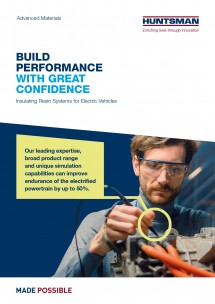The Automatic Pressure Gelation (APG) process uses pressure-tight molds that are fixed in a clamping unit. Casting is typically performed under atmospheric pressure, but it can also be done under vacuum or with special gasses. During gelation, resin is continuously delivered to each mold under pressure, which eliminates voids and compensates for the shrinkage of the material. A central mixing and metering system can feed resin to several clamping machines, which can be set up for batch or continuous production.
Huntsman’s automotive products are the result of many years of leadership in the global electrical insulation sector. We have long-standing relationships with the leading manufacturers of APG equipment.
Huntsman technical support is available to guide customers through the setup phase of all processing parameters. Simulation capabilities help clients to significantly decrease development time, expediting the selection of resin systems and the determination of process parameters.


